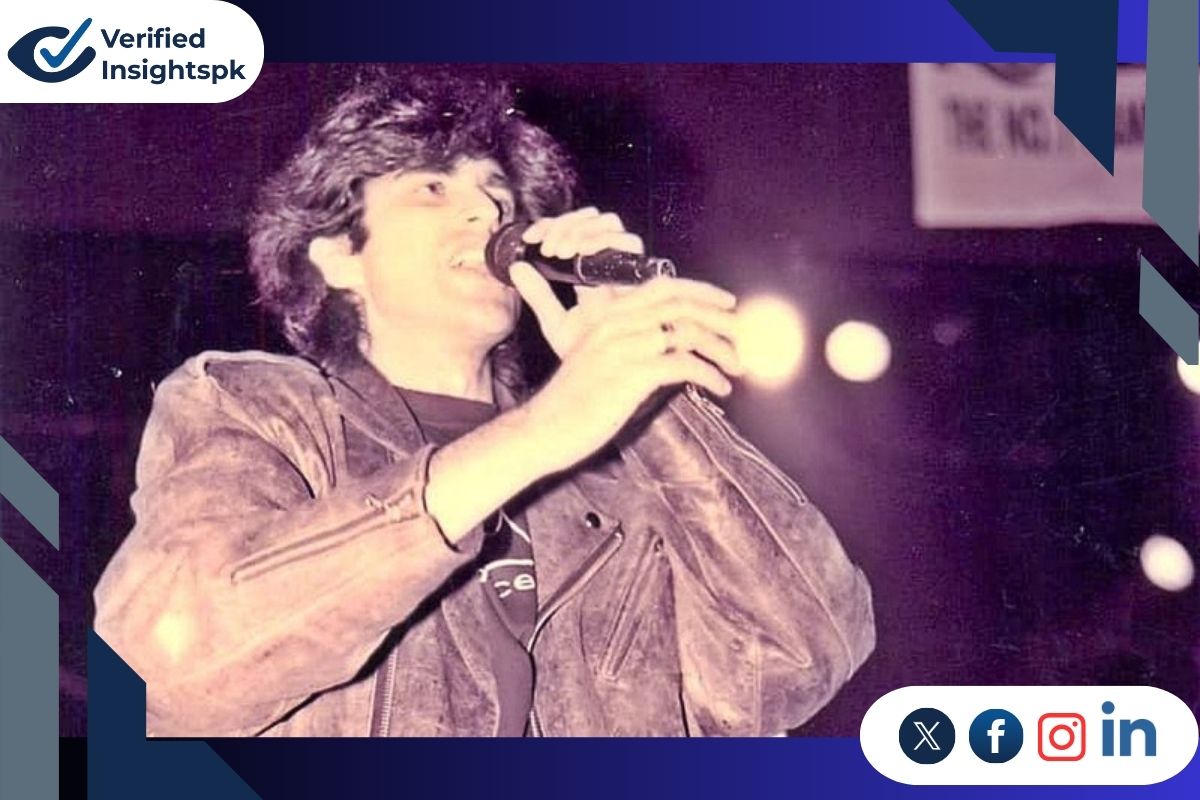
From Pop Icon to Preacher: Junaid Jamshed Biography, Songs, Life and Legacy
Junaid Jamshed was more than a pop star; he was a voice that defined a generation.
From ‘Dil Dil Pakistan’ to heartfelt nasheeds, his journey from music to faith has touched millions.
This is the story of a man who transformed from Pakistan’s most iconic figure to a preacher of Islam.
Quick Information About Junaid Jamshad: Age, Songs, Life, Education, and Career
| Attribute | Details |
| Full Name | Junaid Jamshed Khan |
| Born | 3 September 1964, Karachi, Sindh, Pakistan |
| Died | 7 December 2016 (aged 52), Havelian, Pakistan (PIA Flight 661 crash) |
| Professions | Singer-songwriter, Recording Artist, Television Personality, Fashion Designer, Engineer, Religious Preacher, Televangelist |
| Education | B.Sc. Mechanical Engineering – University of Engineering and Technology (UET), Lahore |
| Early Career | Civilian engineer for the Pakistan Air Force |
| Music Debut | Lead vocalist of Vital Signs (1987) |
| Famous Songs | Dil Dil Pakistan, Sanwali Saloni, Aitebaar, Us Rah Par, Yeh Shaam |
| Solo Albums | Junaid of Vital Signs (1994), Us Rah Par (1999), Dil Ki Baat (2002) |
| Transition | Left music in 2004 to focus on Islam, became a preacher & nasheed artist |
| Nasheeds | Jalwa-e-Janan, Mehboob-e-Yazdaan, others |
| Business Venture | Founder of fashion brand “J.” (Jay Dot) |
| Controversy | In 2014, a blasphemy accusation, he later publicly apologized |
| Family | Survived by wife Ayesha, three sons, and one daughter |
| Legacy | Remembered as Pakistan’s biggest pop icon turned preacher, and a symbol of transformation |
Junaid Jamshed
Junaid Jamshed (1964–2016) remains one of Pakistan’s most beloved figures. He was not only a singer but also a songwriter, engineer, fashion designer, television personality, religious preacher, and entrepreneur. His life is often described as a journey from fame to faith, illustrating how one man underwent a complete transformation yet remained in the hearts of millions.
Junaid Jamshed Songs
Junaid Jamshed’s songs defined an era. As the lead vocalist of Vital Signs and later as a solo artist, he created music that touched generations. His soulful voice and powerful lyrics made his tracks timeless. From patriotic anthems to romantic ballads, his songs are still remembered today.
Dil Dil Pakistan

Perhaps no song in Pakistan’s history is as iconic as Dil Dil Pakistan. Released in 1987 by Vital Signs, with Junaid Jamshed as lead singer, it became a national anthem of love and unity. Even decades later, it is played on Independence Day, in cricket matches, and in national celebrations. For many, Dil Dil Pakistan represents Junaid Jamshed’s lasting gift to the nation.
Vital Signs Junaid Jamshed

Junaid rose to stardom as the frontman of Vital Signs. The band, formed in the late 1980s, became a symbol of Pakistan’s modern music revolution. With hits like “Tum Mil Gaye” and “Aitebaar,” the band cemented its place in South Asian pop history. Vital Signs not only introduced pop-rock to Pakistan but also inspired countless new musicians.
Junaid Jamshed Biography
Born on September 3, 1964, in Karachi, Junaid Jamshed belonged to a military family. His father served in the Pakistan Air Force. Junaid’s childhood was marked by discipline, but he was always passionate about music. He studied engineering, but destiny had other plans. His journey from engineering classrooms to the musical stage, and eventually to the mosque, makes his biography deeply fascinating.
Junaid Jamshed Age
At the time of his tragic death in December 2016, Junaid Jamshed was only 52 years old. Despite his relatively short life, he achieved more than many do in a lifetime. His journey shows how age is less important than the impact one leaves behind.
Junaid Jamshed Engineer Career
Before fame, Junaid dreamed of becoming a fighter pilot in the Pakistan Air Force. Unfortunately, weak eyesight ended that dream. Instead, he studied mechanical engineering at the University of Engineering and Technology, Lahore. He briefly worked as a civilian engineer for the Air Force before music changed his life forever.
Junaid Jamshed Nasheeds
After leaving music in 2004, Junaid Jamshed dedicated himself to Islam. He began reciting nasheeds (Islamic devotional songs). His albums, such as Jalwa-e-Janan, gained popularity across the Muslim world. People admired how he replaced pop lyrics with spiritual messages, maintaining the same passion and melody.
Junaid Jamshed Death
On 7 December 2016, Junaid Jamshed and his wife, Nahya, tragically died in the crash of PIA Flight 661 near Havelian, Khyber Pakhtunkhwa. The news shook Pakistan. Millions mourned the loss of a national icon who had inspired both music lovers and religious followers.
Junaid Jamshed Plane Crash

The plane crash not only ended his life but also marked the end of an era. Junaid was returning from a religious mission in Chitral when the tragedy struck. The incident highlighted the fragility of life and the unpredictability of destiny. His funeral drew massive crowds, reflecting the love and respect he had earned throughout his life.
Junaid Jamshed Transformation

Perhaps the most remarkable part of his life was his transformation. From being the biggest pop star of the 1990s to a preacher of Islam, Junaid’s shift was dramatic. Many criticized his decision, but he stayed firm. He once said that leaving music was difficult but necessary for his faith. His transformation inspired thousands to reflect on their own lives.
Junaid Jamshed Religious Preacher
As a preacher, Junaid Jamshed traveled the world with the Tablighi Jamaat. He delivered speeches, promoted Islamic values, and disseminated messages of peace. Unlike many preachers, his past gave him a unique voice. He could connect with young people, artists, and professionals alike.
Junaid Jamshed Fashion Brand “J.”

In addition to preaching, Junaid entered the fashion world. His clothing brand “J.” (Jay Dot) became a household name in Pakistan and abroad. Known for its quality fabrics and modest clothing, J. continues to thrive even after its founder’s passing. The brand reflects his entrepreneurial spirit and continues his legacy.
Junaid Jamshed Hit Tracks
Some of Junaid’s most popular tracks include:
- Dil Dil Pakistan
- Aitebaar
- Sanwali Saloni
- Yeh Shaam
- Us Rah Par
These tracks remain evergreen. They not only shaped Pakistan’s pop music but also continue to inspire new artists.
Junaid Jamshed Apology 2014
In 2014, Junaid faced criticism over a statement considered blasphemous by some. The backlash was intense. In response, he released a video apologizing for his words and admitting his mistake. His humility and willingness to seek forgiveness won back many supporters.
Junaid Jamshed Solo Albums Us Rah Par
After Vital Signs disbanded, Junaid launched a solo career. His album Us Rah Par (1999) became a massive hit. The title track remains one of the most beloved songs in Pakistan. His other solo works, such as Junaid of Vital Signs and Dil Ki Baat, further demonstrated his talent as an individual artist.
Junaid Jamshed Early Life
A combination of discipline and creativity shaped Junaid’s early life. Growing up in Karachi and attending schools across Pakistan, he developed a love for music. He began singing at universities before joining Vital Signs. His early life hinted at the extraordinary journey ahead.
Junaid Jamshed Works & Legacy
Junaid Jamshed’s works go beyond music. He made significant contributions to fashion, religious preaching, social work, and charity. His legacy is one of duality; he will always be remembered as both Pakistan’s biggest pop star and as a preacher who chose faith over fame. His story teaches that transformation is possible, and that one life can inspire millions.
Conclusion
Junaid Jamshed’s life was like a story of two worlds. From the glamour of pop music to the simplicity of religious devotion, he lived with passion and purpose. His songs, nasheeds, and brand still live on. More importantly, his legacy reminds us that fame fades, but faith and values endure.










